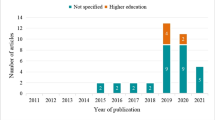Abstract
In recent years, the rise and development of massive open online courses (MOOCs) have promoted the boom of online education and also promoted the research on learning analysis and mining based on big data of education. However, while offering a large number of high quality courses, there is also a phenomenon that the overall learning effect is not ideal. How to make effective use of MOOCs for teaching activities poses urgent practical requirements for educators and researchers. MOOCs store massive learners’ learning behavior data, and mining these data is of great significance to learners’ learning effects. Due to the deviation caused by the correlation between many behavior indexes, the paper analyze the nine measurable performance indexes by principal component analysis (PCA), and get three principal components factors in order to reduce the computational dimension and increase the comprehensibility, and then obtain a model of learning effect prediction, namely the PCA prediction model (PCA_PM). Logistic regression algorithm has a good fitting effect on behavioral indexes. Therefore, the paper use the logistic regression method to construct another model of learning effect prediction, namely the principal component logistic regression prediction model (PCL_PM), and predictive effects of two models were compared and analyzed. The results show that it is an effective way to help learners to improve the passing rate of the course by establishing the predictive models. The prediction accuracy of both PCA_PM and PCL_PM is high, but overall, the prediction effect of PCA_PM is better.
Similar content being viewed by others
References
Hew, K.F., Cheung, W.S.: Students’ and instructors’ use of massive open online courses (MOOCs): motivations and challenges. Educ. Res. Rev. 12, 45–58 (2014)
Stein, L.A.: Casting a Wider Net. American Association for the Advancement of Science (2012)
M. Worldrop: Massive open online courses are transforming higher education and providing fodder for scientific research. Nature 495, 160–163 (2013)
Schrire, S., Levy, D.: Troubleshooting MOOCs: the case of a massive open online course at a college of education. In: EdMedia: World Conference on Educational Media and Technology, 2012, pp. 761–766
Rai, L., Chunrao, D.: Influencing factors of success and failure in MOOC and general analysis of learner behavior. Int. J. Inf. Educ. Technol. 6, 262 (2016)
de Barba, P., Kennedy, G.E., Ainley, M.: The role of students’ motivation and participation in predicting performance in a MOOC. J. Comput. Assist. Learn. 32, 218–231 (2016)
Hill, P.: Emerging student patterns in MOOCs: a graphical view. e-Literate. Recuperado (2013)
Jiang, S., Williams, A., Schenke, K., Warschauer, M., O’dowd, D.: Predicting MOOC performance with week 1 behavior. In: Educational Data Mining 2014 (2014)
Anderson, A., Huttenlocher, D., Kleinberg, J., Leskovec, J.: Engaging with massive online courses. In: Proceedings of the 23rd International Conference on World Wide Web, 2014, pp. 687–698
Kop, R., Fournier, H., Mak, J.S.F.: A pedagogy of abundance or a pedagogy to support human beings? Participant support on massive open online courses. Int. Rev. Res. Open Distrib. Learn. 12, 74–93 (2011)
Kellogg, S., Edelmann, A.: Massively Open Online Course for Educators (MOOC-Ed) network dataset. Br. J. Edu. Technol. 46, 977–983 (2015)
Guo, P.J., Reinecke, K.: Demographic differences in how students navigate through MOOCs. In: Proceedings of the First ACM Conference on Learning@ Scale Conference, 2014, pp. 21–30
Huang, J., Dasgupta, A., Ghosh, A., Manning, J., Sanders, M.: Superposter behavior in MOOC forums. In: Proceedings of the First ACM Conference on Learning@ Scale Conference, 2014, pp. 117–126
Pursel, B.K., Zhang, L., Jablokow, K.W., Choi, G., Velegol, D.: Understanding MOOC students: motivations and behaviours indicative of MOOC completion. J. Comput. Assist. Learn. 32, 202–217 (2016)
Kizilcec, R.F., Piech, C., Schneider, E.: Deconstructing disengagement: analyzing learner subpopulations in massive open online courses. In: Proceedings of the Third International Conference on Learning Analytics and Knowledge, 2013, pp. 170–179
Taylor, C., Veeramachaneni, K., O’Reilly, U.-M.: Likely to stop? Predicting stopout in massive open online courses (2014). arXiv preprint arXiv:1408.3382
Lara, J.A., Lizcano, D., Martínez, M.A., Pazos, J., Riera, T.: A system for knowledge discovery in E-learning environments within the European Higher Education Area—application to student data from Open University of Madrid, UDIMA. Comput. Educ. 72, 23–36 (2014)
Hachey, A.C., Wladis, C.W., Conway, K.M.: Do prior online course outcomes provide more information than GPA alone in predicting subsequent online course grades and retention? An observational study at an urban community college. Comput. Educ. 72, 59–67 (2014)
Romero, C., López, M.-I., Luna, J.-M., Ventura, S.: Predicting students’ final performance from participation in on-line discussion forums. Comput. Educ. 68, 458–472 (2013)
Ramesh, A., Goldwasser, D., Huang, B., Daumé III, H., Getoor, L.: Modeling learner engagement in MOOCs using probabilistic soft logic. In: NIPS Workshop on Data Driven Education, 2013, p. 62
Author information
Authors and Affiliations
Corresponding author
Rights and permissions
About this article
Cite this article
Zhang, W., Qin, S., Yi, B. et al. Study on learning effect prediction models based on principal component analysis in MOOCs. Cluster Comput 22 (Suppl 6), 15347–15356 (2019). https://doi.org/10.1007/s10586-018-2594-0
Received:
Accepted:
Published:
Issue Date:
DOI: https://doi.org/10.1007/s10586-018-2594-0




